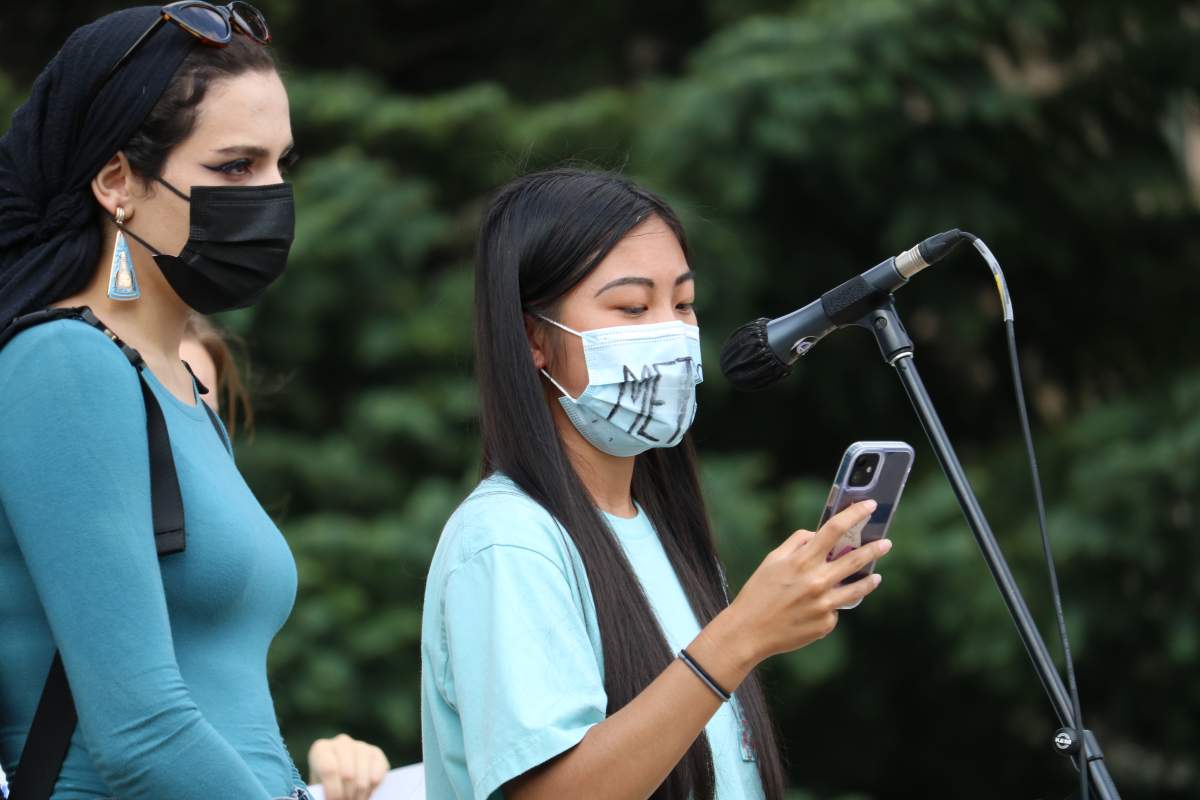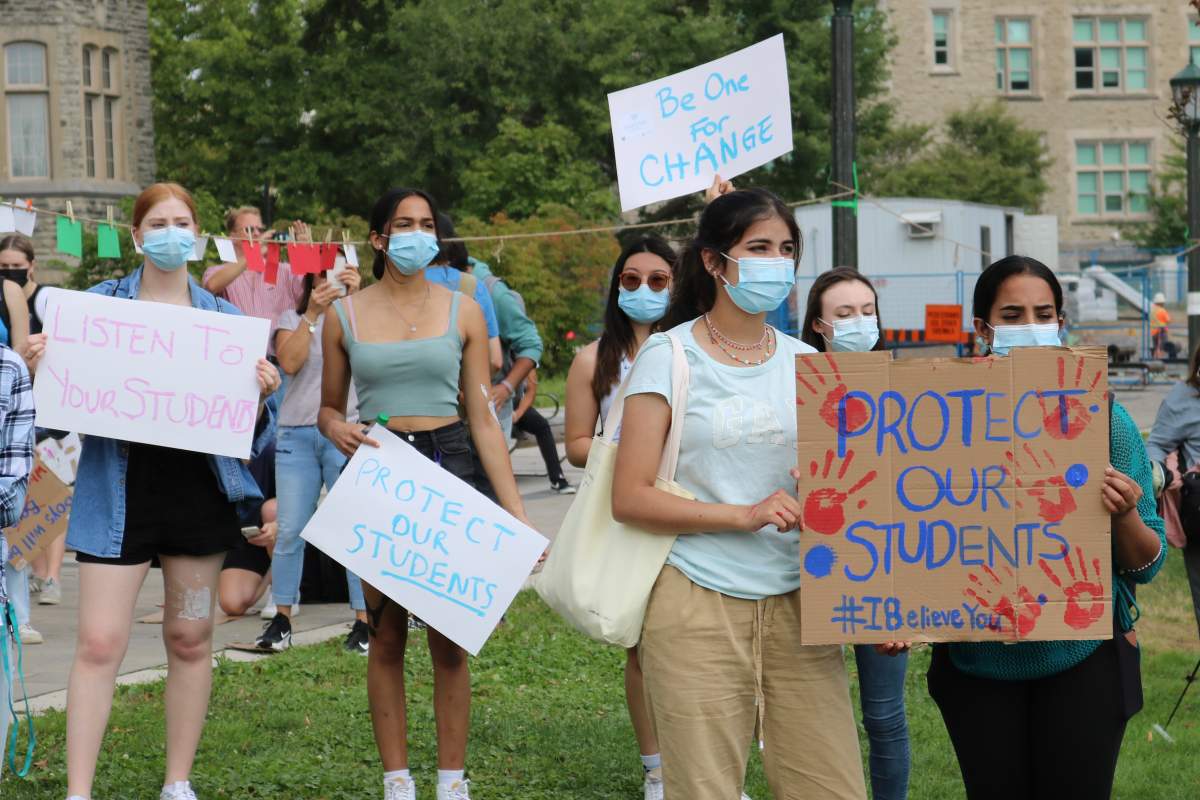Roughly 9,000 students at Western University walked out of class at noon on Friday to protest what they call a “culture of misogyny” on campus after a series of sexual assault allegations surfaced in recent days.

The students were also joined by some faculty and community members in a show of solidarity and support following a difficult week that has thrust issues surrounding gender-based and sexual violence (GBSV) into the national consciousness.
“Western says it protects its students, but the numbers say otherwise — 30 plus girls would say otherwise,” student, speaker and GBSV survivor Teigan Elliott, also part of the King’s University College Red Zone Research Group, said to the massive crowd on Friday.
“Over the past few days, I’ve been asked to not confirm any numbers to the media aside from the four formal complaints. I want to take this time to remind everyone that the vast majority of sexual assaults are not reported. The vast majority of reported sexual assaults do not result in criminal charges.”
When asked for comment, Western University president Alan Shepard told Global News he attended the rally and commended the students for organizing it.
“I did hear those comments. I don’t know where that would have come from. It certainly didn’t come from me.”
Social media reports suggested 30 or more students may have been drugged and/or assaulted in on-campus housing at Western University, although that has not been verified by Global News.
On Tuesday, London police chief Steve Williams and Shepard held a news conference in response to the social media reports.
At that time, police said no one had come forward with a formal complaint related to those online allegations.
Western officials have also confirmed four other formal complaints of sexual violence from students were filed during the first week of school, which do not appear to be related to the weekend events.
Following on those complaints, police said three incidents involving four female victims were under investigation and one person has been arrested.
“Alan Shepard has said our campus is safe. Safe for who?” Elliott asked in her speech.
“Alan Shepard, do you know what it’s like to be unsafe, not just feel unsafe, but actually be unsafe where you live? Do you know what it’s like to walk past the site of the most traumatic experience of your life every day just to get to class? If the answer is no to either of those questions, then I don’t want to hear another word from you about safety.”
Elliott said she is not looking to shift the blame away from the perpetrators, but to acknowledge that the university should do everything in its power to “eliminate the campus culture we have here that encourages violence.”

Get daily National news
“Why were we thrown into classes this week when many of us could barely function? Why was same-day counseling not available immediately? And why are you now trying to solve this with increased security, increased policing? Sophs watched security and police do nothing while we tried to disperse crowds. You think more is going to help?”
Shepard said that he’s reluctant to comment on “the long history of the university before I got here” in 2018, but he acknowledges that “the culture needs some reform.”
“We need to have discussions about the values of the institution, particularly as new students join us at the start of the academic year,” he said.
“We know that the first six to eight weeks of the school year are what’s called the ‘red zone,’ where particularly young women, some men, too, but mostly women are really vulnerable. And we need to do a better job of ensuring their safety. And that’s what we’re going to do with all the steps that we’ve announced yesterday.”
Other speakers were less critical of Western’s response, with one of the event organizers calling Western’s plans to implement a new action plan and task force “a good start.”
“We are happy to see that the administration has addressed many of the calls to action that have come to their attention this week,” said Hayden Van Neck.
- Canadians involved in tourist bus crash in Dominican Republic, embassy says
- Canadians stuck in Middle East say cities ‘very tense’ as Iran conflict escalates
- Alberta mulls ditching time switch — again — as B.C. moves to permanent daylight
- In London, Poilievre pitches new UK, Australia, New Zealand partnership
“We look forward to seeing these plans put into action immediately. Multiple acts of violence rocked our community last weekend. Although this walkout concerns incidents of gender-based sexual violence, we cannot go without acknowledging the passing of first-year student Gabriel Neil.”
Neil, an 18-year-old first-year health science student, died of injuries sustained in a weekend assault. Aliyan Ahmed, 21, of London is facing a manslaughter charge in the case.
Police announced Friday afternoon that officers are seeking a second suspect in the case, Haroun Raselma, 19, of London. He faces one count of manslaughter and is charged by way of a Canada-wide warrant of arrest.
As for Western’s action plan and task force, Van Neck is hoping to see education on “a nuanced understanding of consent,” an outline of what constitutes sexual violence, an acknowledgement that survivors are never to blame, and more.
On Thursday, Western admitted to a “culture problem” and announced its new action plan as well as plans for a Task Force on Sexual Violence and Student Safety.
Part of the safety changes includes requiring mandatory in-person training on sexual violence for all students living in residency starting on Sept. 20.
The university will also hire 100 upper-year undergraduate and graduate students as safety ambassadors to help during the night shift and enhance security on campus during the night shift.
Some faculty members also addressed the crowds at the walkout, with Western’s gender-based violence and survivor support case manager Tamara Will providing information on the resources available for survivors.
“Gender-based and sexual violence refers to any act that target someone’s sexuality, gender identity or gender expression. This includes sexual assault, sexual harassment, domestic violence, stalking, indecent exposure, voyeurism, cyber harassment and sexual exploitation,” she explained.
“My role on campus is supporting students who experience gender-based violence at any time during their lives, whether it happened on campus or off campus. Students don’t have to disclose anything about their experience in order to receive support from my office.”
Director of wellness and well-being at Western, Terry McQuaid, stressed that Western is listening.
“There is a difference between us saying to a survivor, ‘you are safe, this is a safe campus,’ and the survivor’s own feeling of being safe. The incidents of the past week and you being here today tell us that you do not feel safe,” she said.
“This is your campus, your community, and we will continue to do more. We need to do more. Western hears you. Western is taking additional steps to examine the campus culture and identify areas where we can enhance safety and security of our community.”
Attendees at Friday’s walkout shared their frustration, fears, and hope with Global News.
Fourth-year student Sarah Sequeira said she never felt unsafe or uncomfortable on campus until now.
“As someone that works late on campus, too, I have made it a priority to try and make sure people are coming to pick me up or something. And these are just never really things that I had to think about before,” she said.
“At the same time, I think that there has been a pre-existing culture on campus of gender-based violence and things like that. And I’m glad that we’re finally kind of addressing it. I just wish that we could have done more preventative things as opposed to reactive things, as I think the university is doing now.”
Zara Diab, a first year PhD student at Western, said she’s been distraught.
“It makes me feel extremely upset for our students and the well-being of our students and the safety of our students here on campus,” she said.
“I would like to acknowledge that (Western administration is) taking steps, but the steps aren’t immediate enough and they aren’t enough. There’s a lot more work to do.”

However, she was moved by the crowds gathered on Friday and “happy to see that people care about this issue and are willing to come out and support the cause.”
Olivia, a Western student and sexual assault survivor who chose to keep her last name private, shared her experience at the protest about being sexually assaulted by a fellow student on campus in 2020.
“He was three years older than me and about to graduate. People told me to get over it and reporting him would ruin his future,” she said
“This is the reason this event means so much to me today (is) the fact that Western students realized we need something more than the extended drop-in council hours that are being offered.
Olivia added that Western needs to be held accountable in providing a safe environment for all students.
“We deserve to feel safe on campus, no matter who are and where you are going. At this moment Western students do not feel safe,” she said.
— with files from Global News’ Brittany Rosen





















Comments
Comments closed.
Due to the sensitive and/or legal subject matter of some of the content on globalnews.ca, we reserve the ability to disable comments from time to time.
Please see our Commenting Policy for more.